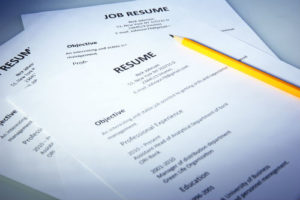 Simply listing out your career accomplishments and highlighting your experiences on an executive resume isn’t enough to get recognized today. In a way, writing resumes that get you hired is all about how you display the information and what keywords you use, no matter how experienced you actually are.
Simply listing out your career accomplishments and highlighting your experiences on an executive resume isn’t enough to get recognized today. In a way, writing resumes that get you hired is all about how you display the information and what keywords you use, no matter how experienced you actually are.
You generally only have about six seconds to impress a recruiter with your resume. And that’s assuming you’ve already passed the automated trackers using the right keywords to even get your resume in the hands of the recruiter. Here are some insider tips about executive resume writing you may find useful.
Unused Keywords and Basic Formatting Issues Can Hurt You
One of the keys to writing resumes that get you hired is using the right keywords throughout the resume. The best way to find these keywords is to look directly at the job description or the list of requirements from the job posting. Identify certain keywords from those places and use them early and often in your resume.
Another aspect that can make or break you is not using the best executive resume format. Use should use bullet points, bold text and indentations to your advantage to make the resume look clean. No one likes to spend a lot of time reading a resume, so the fewer words you can use to get your accomplishments highlighted, the better off you’ll be.
Many Companies Use an Applicant Tracking System
The main reason why keywords are so important today is many companies use an applicant tracking system to filter through resumes. Any given job posting could generate thousands of applicants. The only way a recruiter can narrow them down efficiently is to use technology to identify certain keywords. If your resume doesn’t have the keywords they are looking for, it won’t even make the cut to be looked at by human eyes.
Professional Writing and Feedback is Critical
Receiving objective feedback is important when writing resumes that get you hired. You can get feedback from family, friends, colleagues or even professional executive resume writers. A professional resume writing service can look at a job description, identify the keywords and incorporate them into your resume to optimize it as much as possible.
Professional Resume Services is here to help executives by providing services from some of the top professional executive resume writers. Whether you need to start from scratch with your executive resume, or if you only need a final proofread, we are here to help you. Feel free to contact us at any time for more insight into executive resume writing and how we can help you.
Searching for a new job while being employed presents plenty of challenges. You have to be extra careful when you’re conducting your search, because you don’t want to burn any bridges or seem untrustworthy. The best executive resume writers can help tailor your resume to be confidential, so it won’t be as easy to identify you on a job board. There are many secrets to conducting a confidential executive job search, and here are a few of them we would like to share with you.
Be Creative With Networking
The hidden job market is the best way to go about conducting a secret job search. Nowadays, you don’t have to post your executive resume bio online to get a job. By networking at professional events or through LinkedIn, you can find out about jobs you didn’t even know were available. Even volunteering or being involved in your community can lead to new opportunities, so being active can move your job search forward as well.
Use LinkedIn Carefully
If you don’t have your LinkedIn settings updated appropriately, your connections may be able to see every change you make. Chances are your co-workers, or even your bosses, may be included in your LinkedIn network. You definitely don’t want them to see you update your resume or profile to indicate you’re looking for a new job. When you’re working on your LinkedIn profile development, alter your settings to ensure the wrong people don’t see any changes you’ve made.
Make Your Resume Private
As mentioned, the best executive resume writers know how to effectively make a resume confidential. By using the term “confidential applicant” instead of using your name, you’ll avoid showing up on your current employer’s search for a new candidate. Also, not using your company’s name anywhere on the resume is important. These are just a couple ways you can make your resume private, and a potential employer will understand why you’re doing it.
Conduct Your Job Search On Your Own Time
Nothing is worse than conducting a job search on company time. If your current boss finds out, there’s a chance you could be fired. And if your potential employer finds out you’re conducting your search on company time, they may think you’ll do the same to them and not offer you a job. Do yourself a favor and only send out your executive resume bio when you’re not on company time.
Professional Resume Services is here to help you conduct a confidential executive job search. We have the best executive resume writers to help you in this area, so you can feel confident sending in your resume to potential employers. Feel free to reach out to us at any time if you need other secrets to pulling off a confidential job search.
Making a mistake in your executive resume can be detrimental to your success in landing your next job. Even if you use the best executive resume format imaginable, a typographical errors shows you could lack attention to detail, which is an important characteristic of any executive.
Proofreading your executive resume is essential, but proofreading it the right way is even more important. When you’re working on your resume for several hours, it’s easy to overlook a mistake. Here are some of the top ways you should proofread your resume.
Proofread Out Loud
When you read your resume out loud to yourself or to someone else, you’ll be able to identify some obvious issues. Whether the issues revolve around the overall flow of your resume or a word that simply doesn’t make sense, sometimes reading it out loud will help identify problems you overlook when reading it silently.
Don’t Skip Sections
The key to writing resumes that get you hired is to treat every section of your resume with equal importance. If you have a references section, proofread the phone numbers or other contact information. It’s easy to skip sections like this, but it will look unprofessional if your potential employer calls a wrong number when trying to reach your reference.
Have a Peer Review Your Resume
Your peers can play a big role in your effort to create resumes that get you hired. Ask a friend or family member you trust to look over your executive resume in detail. When you’ve looked at your resume for several hours over the course of a few days, sometimes it’s easy to overlook minor details. Having a peer review your resume can help identify these minor issues to clean up your resume overall.
Hire a Professional Resume Service
Hiring a quality professional resume writing service to proofread your resume should be your last step before finalizing your resume. But just because it’s the last step doesn’t mean it should be skipped. With the highly competitive job market today, having a professional proofread your resume can ensure it is in the best shape possible for improving your chances of getting an interview.
At Professional Resume Services, we can help executives not only write their resumes, but proofread them and provide constructive criticism and suggestions to make it better. If you are pleased with your resume, but want another set of experienced eyes to review it, feel free to reach out to us at any time.
What you say during your executive job interview plays a huge role in determining whether you get the job. On the same notion, your body language is a factor as well. You’ve worked hard to optimize your LinkedIn profile to get noticed and eventually land an interview, so learning some body language tips will help you succeed once you get there. Here are some of the top executive interview tips people don’t think about, but should.
Eye Contact Demonstrates Trust
Always make eye contact with your interviewer. Eye contact shows they can trust you, since people who don’t make good eye contact might have something they’re hiding. Of course, try to avoid staring as much as possible, so looking away occasionally will reduce some awkwardness.
 Firm Handshakes Show Confidence
Firm Handshakes Show Confidence
Follow up your strong executive profile with a strong handshake when you meet your interviewer. A firm handshake shows you are a confident person, so practice with peers or family members if you have to. A good handshake is memorable to an interviewer, since it’s likely the first in-person impression they have of you.
Have Good Posture
No interviewer wants to see a slouch in chair across from them. Slouching or posture other than sitting up straight shows you may not be too interested in the job. Even worse, slumping in your chair may indicate a lack of confidence, no matter how strong your executive profile is.
Be As Natural As Possible
Too many people spend way too much time studying interview questions and rehearsing their answers. While this is good to an extent, studying too hard can make you sound unnatural. If you used an executive resume writer to polish up and make your resume sound natural, translate some of their tips for your interview. Things like nodding and smiling are natural gestures, so don’t hold them back. The hard part is noticing the gestures you make as a nervous habit, so be careful not to use them to the point where they become unnatural.
Professional Resume Services does much more than simply write resumes. We can help you by giving advice on how to land interviews, what to do in interviews and even how to optimize your LinkedIn profile, just to name a few. Be sure to reach out to us if you need any assistance with any aspect of your executive job search.
With the world of automation today, it can be virtually impossible to get your executive resume into human hands if you only submit it online through job boards. It may be much easier and convenient to send in your resume online, but there’s no guarantee it will ever been seen. Recruiters will scan resumes for certain keywords and keyphrases using technology in order to eliminate as many as possible. If yours isn’t formatted perfectly, or if you don’t use the right words, it will be quickly brushed off.
So how can you write resumes that get you hired, but have a better chance of getting them into human hands? Here are a few tips to consider.
Optimize Your Keywords
Keywords are the most essential component of any effective resume. Any executive resume writer will look at your skills, qualifications and accomplishments and simply reword them to use appropriate keywords for your industry. This is the best chance you have at getting your executive resume through the automated keyword filter.
 Look For Connections
Look For Connections
Sometimes the best way to get your resume into human hands is to bypass technology completely. When you make connections with people in your industry, you may not even have to send in a resume online. You still have to focus on writing an effective resume, so don’t think your connection will guarantee you an interview. It’s just one of the best ways to get around the initial resume submission stage.
Be Short and Concise
No one wants to read a long resume. You have an average of six seconds to impress a recruiter or HR manager. The first thing an executive resume writer should do is look how to tighten up sentences and sections. Try to keep your resume to two pages or less, but the shorter the better.
Choose Your Approach Carefully
Whether you choose to submit your resume online or in person, following up with the company is important to know where you stand. Sometimes your resume is filtered out right away because of keywords, but sometimes it could have been lost in the shuffle. Without checking in periodically, you may never know. Just be careful not to follow-up too much to the point where you look desperate.
Professional Resume Services helps executives with writing an effective resume every day. Our skilled professionals know the tricks to getting resumes into human hands, so if you are struggling with the process or need assistance in any way with your job search, feel free to contact us at any time.
After spending hours on your resume, the easy thing to do is just copy and paste the information over to your executive LinkedIn profile. While this makes sense on the surface, since LinkedIn provides the same type of information as your resume, it’s one of the worst things you can do.
Recruiters do diligent research on candidates and look at many different platforms to learn as much as they can about you. If they see your resume copied over to your LinkedIn profile, it shows your lack of creativity and potential disinterest in finding a new job. While there are some similarities between your resume and LinkedIn profile, there are many more differences between the two.
What to Include on Your Resume
The best resume writing service can help you pick out the biggest points and facts from your career up to this point and display them on your resume. This is the document where you need to be cut-and-dry by highlighting specific experiences and accomplishments. You shouldn’t have a lot of text next to each bullet point on your resume, because you need to remember a recruiter spends an average of about six seconds reading any given resume and doesn’t want to read a bunch of fluff.
What to Include on Your LinkedIn Profile
Your executive LinkedIn profile gives you the opportunity to tell the backstory on those short bullet points you have in your resume. You don’t have to tell your complete life story (and it’s recommended that you don’t), but you can give a little background to put your achievements into perspective.
When you’re working on your LinkedIn profile development, you also need to be more general instead of targeted. Your LinkedIn network is full of diversity, so you could be missing out on opportunities by being specific about your role and interests. This goes against how a resume is crafted, but it’s important to make the distinction.
Always Separate The Two When Job Searching
When you’re searching for an executive position, you never know if your resume or your executive LinkedIn profile will be viewed first by a recruiter. The two are similar only because they are tools to help you land a new job. The content may be similar, but it should be displayed very differently. Keeping the two separate and distinct will help your job searching efforts tremendously.
At Professional Resume Services, we work every day to help executives with LinkedIn profile development and resume writing. It’s difficult to wrap your mind around how different these two are, but we are here to guide you on the right path. Feel free to set up a time to talk if you have questions or need assistance with any aspect of your executive resume or LinkedIn profile.
When you sit down to write an executive cover letter, you may have many different thoughts running through your mind. Will the hiring manager even read this? Why can’t I simply regurgitate my resume? Aren’t all cover letters the same?
The truth is, cover letters are difficult to write when you write them properly. They shouldn’t be the same as your resume, and yes, hiring managers do read the good ones. You just have to make yours stand out from the rest by being appropriately creative in your writing. If this doesn’t seem like your style, here are some tips from a cover letter writing service to help you out.
Distinguish Cover Letters From Resumes
One mistake many executives make is turning their resume into paragraph form and calling it a cover letter. This isn’t the purpose. Your executive cover letter should show more of your personality and creativity, rather than your experiences in the industry. You will likely send in your resume and cover letter at the same time, so no one will want to read the same thing twice.
Be Brief and To The Point
Don’t include more than two or three paragraphs on your executive cover letter. In fact, cover letters closely resemble executive profiles, since they should just be short statements describing your value and what you bring to the table. No hiring manager wants to read a lengthy cover letter.
Showcase Your Ability to Help The Company
As far as the content of your executive cover letter goes, write more about how you can help the company, rather than focusing on your past achievements. You may need to use a cover letter writing service to help iron out the details. It’s easy to talk about how good of an employee you are, but everyone does that. When you demonstrate your knowledge about the company and tie in your experiences, your cover letter will stand out.
Be Creative and Conversational
As an executive, most resumes and cover letters you write are likely cut-and-dry. It doesn’t hurt to be a little creative, at times. Try writing your executive cover letter in more of a conversational tone. Incorporate random facts about your industry or tell a very short story to keep the reader engaged.
Professional Resume Services knows the ins-and-outs of a great executive cover letter. We are an executive resume writing service with expertise in resumes, cover letters, networking, LinkedIn profile development and more. If you’re struggling with your cover letter in any way, feel free to reach out to us at any time.
 Experienced executives have a lot of knowledge that may be beneficial to many other people. If you have a good amount of experience and have decent writing skills, you could enhance your career even further by starting a blog. Even new executives who may not have a lot of experience, but have a lot of ideas, can benefit from blogging.
Experienced executives have a lot of knowledge that may be beneficial to many other people. If you have a good amount of experience and have decent writing skills, you could enhance your career even further by starting a blog. Even new executives who may not have a lot of experience, but have a lot of ideas, can benefit from blogging.
Blogging usually isn’t something executives think of when it comes to boosting c-level personal branding. The benefits are proof enough for you to consider starting one, though.
Blogging Can Get You Noticed
You’d be surprised at how many executives like you search for different articles to help their craft. If your blog offers what they need, you may start building a nice collection of subscribers who want to read your material. Being noticed online in a positive light is one of the best ways to enhance your career.
You Could Build Your Network Through Blogging
You may already have hundreds of connections through your LinkedIn profile, but you can expand it even further with a blog. Consider putting the link to your blog in your LinkedIn profile as well, so your current connections know you have one. You never know who will read your material online, so it’s always best to put it out there as much as possible.
Blogging Will Put Your Name in Search Engine Results
If you’re actively searching for a job and have applied to several places, the first thing those companies will do is search for your name. Your LinkedIn profile is important to them, but they also want to see what else is on the Internet about you. When links to your personal blog with insightful topics and advice come up, you’ll have a better shot at landing an interview compared to someone who doesn’t show up in the search results at all.
Use Keywords and Write About Relevant Topics Naturally
Writing a blog is different than writing an executive bio. Use your blog as a chance to show your casual, laid back side rather than the uptight business professional you have to be every day at work. Incorporate the keywords you have to use throughout the day and talk about those topics as well, so you can relate to people in your industry. Being as natural as possible on your blog will be a relief to you and your readers.
At Professional Resume Services, we look for every way imaginable to boost your career. Whether it’s optimizing your resume, helping you incorporate your blog into your LinkedIn profile or writing your executive bio, we can help guide you in the right direction. Feel free to contact us at any time for advice on blogging or any other topic related to your career advancement.
 Simply listing out your career accomplishments and highlighting your experiences on an executive resume isn’t enough to get recognized today. In a way, writing resumes that get you hired is all about how you display the information and what keywords you use, no matter how experienced you actually are.
Simply listing out your career accomplishments and highlighting your experiences on an executive resume isn’t enough to get recognized today. In a way, writing resumes that get you hired is all about how you display the information and what keywords you use, no matter how experienced you actually are. 






